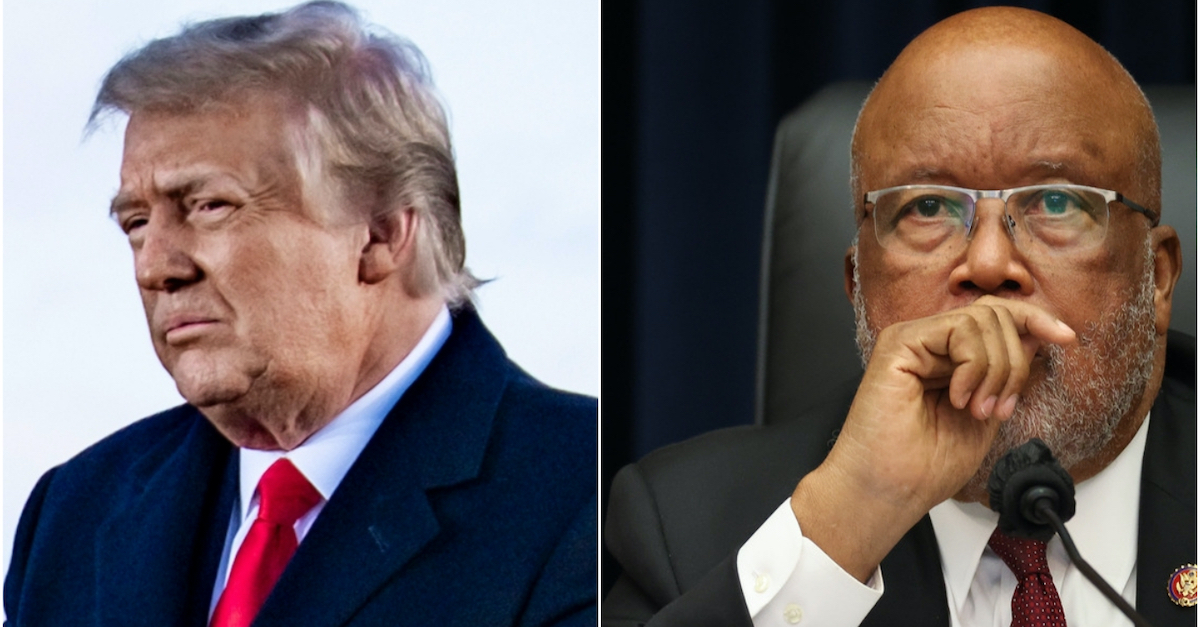
Former President Donald Trump and Rep. Bennie Thompson (D-Miss.), the chair of the Jan. 6th Committee
A three-judge appellate court has granted former president Donald Trump‘s request to block release of documents sought by the House committee investigating the Jan. 6 attack on the U.S. Capitol.
On the eve of the production deadline, Trump filed an “emergency” request with the U.S. Court of Appeals for the District of Columbia Circuit to temporarily block hundreds of files subpoenaed by the Select Committee to Investigate the Jan. 6 Attack on the U.S. Capitol—until he can pursue an appeal seeking to permanently keep the documents under wraps.
The panel’s order was brief, and made sure to point out that the administrative injunction was not a ruling on the merits of Trump’s claim:
ORDERED that an administrative injunction be entered and appellees the National Archives and Records Administration and the Archivist be enjoined from releasing the records requested by the House Select Committee over which appellant asserts executive privilege, pending further order of this court. The purpose of this administrative injunction is to protect the court’s jurisdiction to address appellant’s claims of executive privilege and should not be construed in any way as a ruling on the merits.
The judges also approved an expedited briefing request, and set a hearing date of Nov. 30.
The panel consists of two Barack Obama appointees—Patricia A. Millett and Robert L. Wilkins—and one Joe Biden appointee, Ketanji Brown Jackson.
The filing Thursday from Trump attorney Jesse Binnall specifically asks the U.S. Court of Appeals for the District of Columbia for “a brief administrative injunction to maintain the status quo and allow the Court to consider, on an expedited basis, whether to grant an injunction pending appeal.”
The National Archives has agreed to hold off on providing the committee with the subpoenaed information, including Trump’s conversations with some 40 people dating back to April 2020 and polling data information to help the committee pin down when he knew that he was going to lose the 2020 election. The committee also sought 46 pages of records from the files of former chief of staff Mark Meadows, ex-senior adviser Stephen Miller, and ex-deputy counsel Patrick Philbin from Archivist David Ferriero, one of the defendants in Trump’s lawsuit.
Invoking a novel claim of post-presidency executive privilege, Trump sued the investigating committee, its chairman Rep. Bennie Thompson (D-Miss.), the National Archives and Ferriero on Oct. 18, calling the document requests “illegal, unfounded, and overbroad.”
On Tuesday, U.S. District Judge Tanya Chutkan disagreed, finding that executive privilege was no longer Trump’s to claim—if indeed, he could ever assert it so broadly.
“Presidents are not kings,” Chutkan wrote, “and Plaintiff is not President.”
Biden expressly waived privilege over the requested documents, Chutkan noted, refusing a separate request for an injunction during Trump’s appeal.
The emergency injunction request argues that Trump will be “irreparably harmed” if the Jan. 6 documents are released.
Absent judicial intervention, President Trump will suffer irreparable harm through the effective denial of a constitutional and statutory right to be fully heard on a serious disagreement between the former and incumbent President. President Trump is one of only five living Americans who, as former Presidents, are entrusted with protecting the records and communications created during their term of office. GSA, the Presidential Records Act, its associated regulations, and Executive Order 13489 are clear: a former President is not merely a “private party.” Instead, he has the right to be heard and to seek judicial intervention should a disagreement between the incumbent and former Presidents arise regarding congressional requests and executive privilege.
The disclosure of the documents themselves is clear irreparable harm. If the Court does not intervene, the Archivist could give the Committee confidential, privileged information. Once disclosed, the information loses its confidential and privileged nature. If such material is disclosed before President Trump has had a proper opportunity for appellate review, “the very right sought to be protected has been destroyed.” [citations removed]
According to the filing, the Jan. 6 committee “takes no position on the request for an administrative injunction” and proposes and expedited briefing schedule in order to address the forthcoming request.
You can read Trump’s emergency motion and the appellate court’s ruling, below.